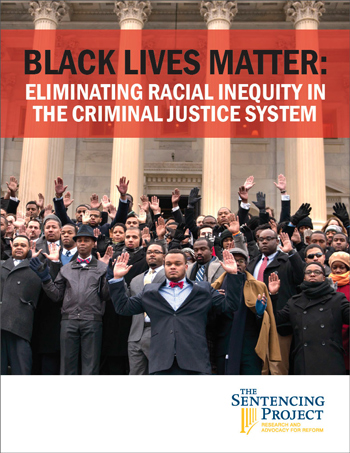By Charlene Muhammad CHARLENEM

(FinalCall.com) – The Sentencing Project’s report “Black Lives Matter: Eliminating Racial Inequity in the Criminal Justice System” was another scathing indictment of over-policing in Black and Brown communities and its adverse effects.
The report, released Feb. 2, by the Washington, D.C.-based organization surveyed programs and policies in more than 20 states and the federal system aimed at reducing legal system racial disparity, such as the disproportionate numbers of Blacks who experience fatal encounters with police.
Report authors found beyond socioeconomic inequality preceding any contact, four key features of the criminal justice system produce racially unequal outcomes. Supposedly “race-neutral” policies and laws–such as “broken windows” and stop, question and frisk–have a disparate racial impact. Racial bias in law enforcement “discretion” in traffic stops and underfunding of indigent defense programs hurt poor people, disproportionately Black and Latino. Housing or public assistance disqualification for those with felony drug convictions keep unequal justice going, the report found.
“The biggest thing, we can’t look at it just as an isolated matter of police reform. We have to look at trying to reform the criminal justice because it’s the courts, it’s the politicians and the police,” said Attorney Benjamin Crump, whose firm Parks and Crump represents the Trayvon Martin, Michael Brown, Jr., the Chavis Carter families and other high profile cases involving police shootings or suspicious Black injuries or deaths.
The jury system is supposed to kick-in when police leadership fails to do its jobs, fails to train and supervise officers, he noted. The district attorney is supposed to step in and police the police, said Atty. Crump. But prosecutors have a symbiotic relationship with police and secret grand juries that free officers who should be charged with using excessive force and police brutality, he said.
“There’s a systemic problem that is larger than just a police issue. It’s a criminal justice issue, so we need grand jurors to make sure that the police who are supposed to police the police are policing them,” Atty. Crump told The Final Call.
The Sentencing Project’s examination of policing in Ferguson, Mo., where former officer Darren Wilson killed unarmed Michael Brown, Jr., and the initial encounter was for jaywalking, showed what Black communities have been saying and working to eradicate for decades: Black and White Americans are policed differently. Blacks in Ferguson were 3.5 times more likely than Whites to be stopped by police.
Nationally, the report said, police are more likely to stop, search and arrest people of color. Prosecutors are more likely to charge Blacks and Latinos with crimes that carry heavier sentences than Whites, it said. Judges are more likely to sentence non-Whites than Whites to jail or prison with longer sentences, the report added.
“In this 50th year celebration of the 1965 Voting Rights Act, in many ways, we are no better off than we were 50 years ago,” stated Dr. Alpha Omega Curry, Southwest regional representative for the National Association of Blacks in Criminal Justice. How does one seize the opportunity to end excessive policing and excessive punishment of people of color? She advocates re-education, education, training, legislation, commitment, prayer, recruitment, hiring, firing, community engagement and civilian oversight.
“First let me say that in my opinion there is no such thing as ‘trying.’ When we try, we have already set ourselves up for failure. So I don’t advocate that we ‘try’ anything. We either do it or we don’t do it. Seizing the opportunity is not about marching, protesting, and rioting. The human life of African-Americans and Latinos are continually being devalued. Lives are still being lost and our people are still being held in bondage,” she said.
Anti-racism author Tim Wise told The Final Call the report’s recommendations are valuable and reforms it highlights are important, but without a mass movement to push for reforms, well-crafted position papers won’t mean much.
Some best practices for reform hailed from Seattle, New York City, Florida’s Miami-Dade and Broward County Public Schools, and the Los Angeles Unified School District.
Seattle implemented a pre-booking diversion strategy program which gives police officers the option of transferring people arrested on drug and prostitution charges to social service programs rather than deeper into the criminal justice system.
Officials in Clayton County, Ga., reduced school-based juvenile court referrals which resulted in a 46 percent reduction for Black students.
“Fact is, the reason these kinds of reform efforts aren’t more broadly implemented is because they aren’t functional to a system of social control, which is what the penal state has become. If you actually reduce incarceration, particularly for young folks of color, you have to have a serious plan for job creation and educational equity and housing, and those are things over which prison reform organizations, alone, have no control,” Mr. Wise stated.
“Incarceration is big money. Private prison companies are forcing states to sign lock-up contracts, whereby the state promises to maintain private prisons at a certain capacity, and if they fall short, because, God forbid crime rates drop, then they have to pay a large penalty to the company to make up for lost revenue. It’s a sick system,” he said.
He agrees with the Malcolm X Grassroots Movement and activists in the streets with the #BlackLivesMatter movement. “We need real measures of police accountability: special prosecutors in all cases of police misconduct, as local DA’s have proven themselves incapable of treating these cases seriously, and also, and most importantly, we have to move towards a system whereby communities have direct input into who polices their communities,” Mr. Wise said.












